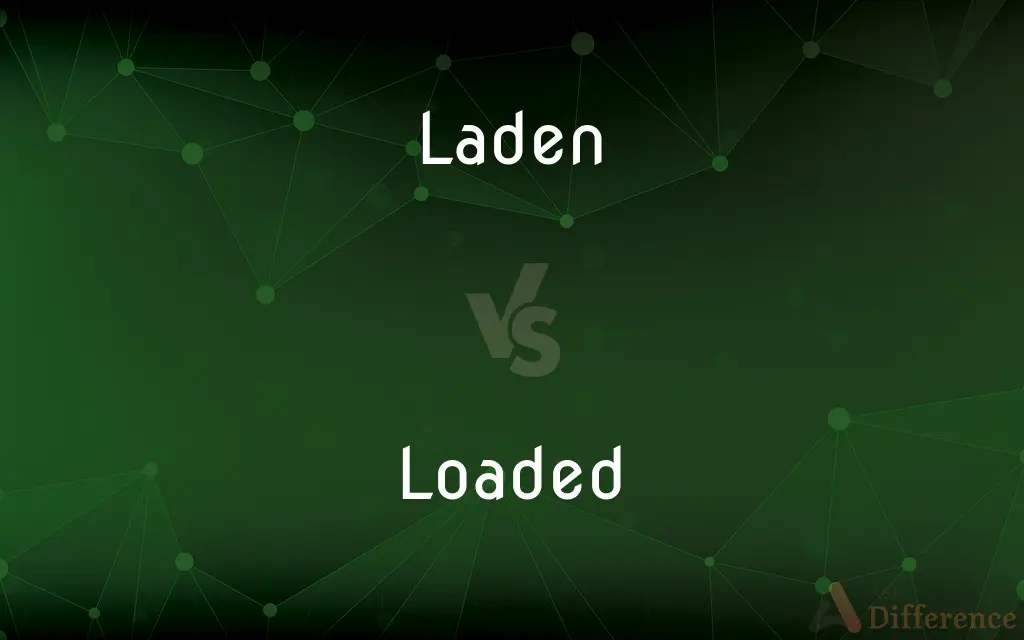Laden vs. Loaded — What's the Difference?
By Fiza Rafique & Urooj Arif — Updated on March 25, 2024
"Laden" refers to being heavily burdened, often by non-specific or abstract weights, while "loaded" implies being filled or equipped, commonly with tangible items.

Difference Between Laden and Loaded
Table of Contents
ADVERTISEMENT
Key Differences
Laden is used to describe something or someone that is heavily burdened or weighed down, often with a sense of being overwhelmed or encumbered. This can apply to both physical loads and metaphorical burdens, such as emotions or responsibilities. On the other hand, loaded typically refers to something that has been filled up or equipped with something specific, often implying a capacity or readiness for use, such as a loaded gun or a loaded vehicle.
While "laden" conveys a sense of heaviness and possible strain, suggesting that the weight might be cumbersome or too much to bear comfortably, "loaded" suggests a state of preparedness or abundance, often with a positive connotation unless context indicates danger (e.g., a loaded weapon). For instance, a tree can be laden with fruit, implying it is heavily burdened, whereas a table can be loaded with food, suggesting abundance and readiness for diners.
In the context of emotional or metaphorical use, "laden" is more commonly used. Someone might be described as being laden with grief or laden with duties, highlighting the heaviness and burden of their feelings or responsibilities. Conversely, "loaded" in a metaphorical sense can refer to someone being wealthy or having a lot of resources at their disposal, often used colloquially as in "he's loaded."
The etymology of "laden" comes from the Old English "hlaðian," meaning to load, heap, or burden, emphasizing the act of being weighed down. "Loaded," deriving from "load," which has roots in the Old English "lād" (way, course, carrying), focuses more on the act of filling or preparing. This linguistic origin reflects the nuanced difference in how each word conveys the state of being filled or burdened.
The choice between "laden" and "loaded" can subtly affect the tone and implication of a sentence. Using "laden" might evoke a sense of sympathy or concern, as it often highlights a burden. In contrast, "loaded" might convey a sense of capability or readiness, or in some contexts, caution due to potential danger or excess.
ADVERTISEMENT
Comparison Chart
Meaning
Being heavily burdened, either physically or metaphorically.
Being filled or equipped, often with tangible items.
Connotation
Often negative, implying difficulty or strain.
Can be positive (abundance, readiness) or negative (dangerous).
Use
Both physical and metaphorical, emphasizing weight or burden.
Primarily physical, but also metaphorical, emphasizing capacity or abundance.
Example Context
Emotions, responsibilities, or physical loads.
Ammunition, wealth, or abundance of items.
Origin
Old English "hlaðian" - to load, heap, or burden.
Old English "lād" - way, course, carrying.
Compare with Definitions
Laden
Heavily burdened or weighed down.
The old shelves were laden with books.
Loaded
Filled or equipped with something.
The truck was loaded with supplies.
Laden
Filled with a great quantity of something.
The air was laden with the scent of jasmine.
Loaded
Burdened with a lot of something (less commonly used).
The documentary is loaded with information.
Laden
Implied to be under pressure or strain from a burden.
The tree branches were laden with snow.
Loaded
Emphasizing abundance or readiness.
The buffet table was loaded with dishes.
Laden
Carrying a heavy load or burden.
She was laden with groceries.
Loaded
Having a lot of something, often money.
After the investment, he was loaded.
Laden
Overwhelmed by a lot of something, often non-tangible.
He felt laden with remorse.
Loaded
Prepared or charged, as with a firearm.
The security guard kept a loaded weapon.
Laden
Heavily loaded or weighed down
The moisture-laden air
A tree laden with apples
Loaded
Carrying a load.
Laden
A past participle of lade.
Loaded
Equipped with many accessories or features
Bought a fully loaded minivan.
Laden
Weighed down with a load; heavy
"the warmish air, laden with the rains of those thousands of miles of western sea" (Hilaire Belloc).
Loaded
Having ammunition in the firing chamber or magazine. Used of a firearm
A loaded gun.
Laden
Oppressed; burdened
Laden with grief.
Loaded
Unbalanced because of added weight. Used of dice.
Laden
Weighed down with a load, burdened.
Loaded
Having great meaning, seriousness, or implication
He asked the loaded question if they should take one car or two.
Laden
Heavy.
His comments were laden with deeper meaning.
Loaded
(Slang) Drunk or intoxicated.
Laden
Oppressed.
Loaded
(Slang) Having a great deal of money; rich.
Laden
(chemistry) In the form of an adsorbate or adduct.
Once laden it is easy to regenerate the adsorbent and retrieve the adsorbed species as a gas.
Loaded
Simple past tense and past participle of load
Laden
Past participle of lade
Loaded
Burdened by some heavy load; packed.
Let's leave the TV; the car is loaded already.
Laden
Loaded; freighted; burdened; as, a laden vessel; a laden heart.
Ah sinful nation, a people laden with iniquity.
A ship laden with gold.
Loaded
(of a projectile weapon) Having a live round of ammunition in the chamber.
No funny business; this heater's loaded!
Laden
Remove with or as if with a ladle;
Ladle the water out of the bowl
Loaded
(colloquial) Possessing great wealth.
He sold his business a couple of years ago and is just loaded.
Laden
Fill or place a load on;
Load a car
Load the truck with hay
Loaded
(slang) Drunk.
By the end of the evening, the guests in the club were really loaded.
Laden
Filled with a great quantity;
A tray loaded with dishes
Table laden with food
`ladened' is not current usage
Loaded
(baseball) Pertaining to a situation where there is a runner at each of the three bases.
It's bottom of the ninth, the bases are loaded and there are two outs.
Laden
Burdened psychologically or mentally;
Laden with grief
Oppressed by a sense of failure
Loaded
Of a die or dice: weighted asymmetrically, and so biased to produce predictable throws.
He was playing with loaded dice and won a fortune.
Loaded
(of a question) Designed to produce a predictable answer, or to lay a trap.
That interviewer is tricky; he asks loaded questions.
Loaded
(of a word or phrase) Having strong connotations that colour the literal meaning and are likely to provoke an emotional response. Sometimes used loosely to describe a word that simply has many different meanings.
"Ignorant" is a loaded word, often implying lack of intelligence rather than just lack of knowledge.
Loaded
(of an item offered for sale, especially an automobile) Equipped with numerous options.
She went all out; her new car is loaded.
Loaded
Covered with a topping or toppings.
Loaded fries
Loaded potato wedges
Loaded
Weighted with lead or similar.
A loaded cane or whip
Loaded
Containing as much or as many as is possible; - of containers, vehicles, trays, etc.; as, a tray loaded with dishes
Loaded
Containing a shell or an explosive charge ready for firing; - of firearms. Opposite of unloaded.
Loaded
Charged with associative significance and often meant to mislead or influence; - of statements or questions; as, a loaded question.
Loaded
Having an abundant supply of money or possessions of value; as, She was not merely rich but loaded.
Loaded
Very drunk.
Loaded
Filled with a great quantity;
A tray loaded with dishes
Table laden with food
`ladened' is not current usage
Loaded
(of weapons) charged with ammunition;
A loaded gun
Loaded
(of statements or questions) charged with associative significance and often meant to mislead or influence;
A loaded question
Loaded
Having an abundant supply of money or possessions of value;
An affluent banker
A speculator flush with cash
Not merely rich but loaded
Moneyed aristocrats
Wealthy corporations
Loaded
Very drunk
Common Curiosities
Is "laden" only used metaphorically?
No, "laden" can describe physical burdens as well, though it is also often used metaphorically.
Can "laden" and "loaded" be used interchangeably?
While they have similar meanings, their usage depends on context; "laden" emphasizes burden, while "loaded" focuses on capacity or abundance.
What does it mean when someone is described as "loaded"?
Colloquially, it means they have a lot of money or resources.
What indicates that "loaded" can be positive?
Its use to describe abundance or preparedness, like a loaded table of food, suggests a positive aspect.
Can an object be both "laden" and "loaded"?
Yes, depending on context. For example, a vehicle can be laden with weight and loaded with cargo.
Can "loaded" imply danger?
Yes, especially in contexts referring to weapons or situations fraught with potential risk.
Is "laden" used in contemporary language?
Yes, although it might be considered more formal or literary, it's still used in both written and spoken English.
Does "laden" always imply a negative condition?
Often, but not always. It usually suggests a heavy burden, but the context can sometimes give it a neutral or slightly positive tone.
What is the difference in emotional connotation between "laden" and "loaded"?
"Laden" often carries a heavier, more burdened emotional connotation, while "loaded" can suggest wealth or abundance, or readiness.
How does the physical versus metaphorical use of these terms differ?
"Laden" is more flexible, used both physically and metaphorically, while "loaded" is often more literal but also has metaphorical uses, particularly in colloquial speech.
Share Your Discovery

Previous Comparison
Welcome vs. Welcomely
Next Comparison
Befriend vs. FriendAuthor Spotlight
Written by
Fiza RafiqueFiza Rafique is a skilled content writer at AskDifference.com, where she meticulously refines and enhances written pieces. Drawing from her vast editorial expertise, Fiza ensures clarity, accuracy, and precision in every article. Passionate about language, she continually seeks to elevate the quality of content for readers worldwide.
Co-written by
Urooj ArifUrooj is a skilled content writer at Ask Difference, known for her exceptional ability to simplify complex topics into engaging and informative content. With a passion for research and a flair for clear, concise writing, she consistently delivers articles that resonate with our diverse audience.














































